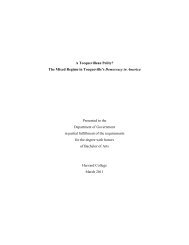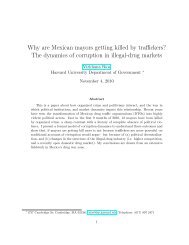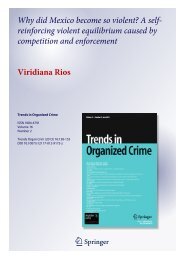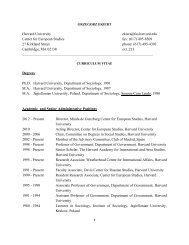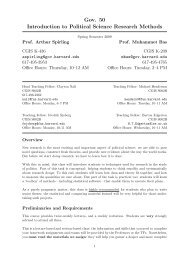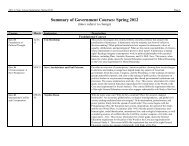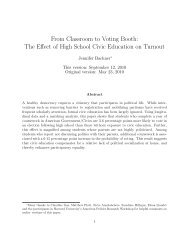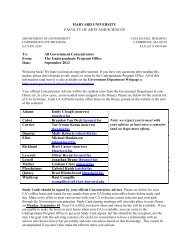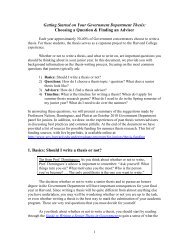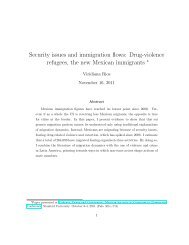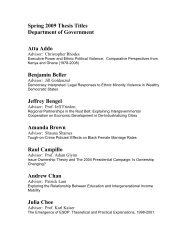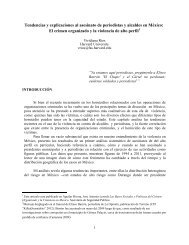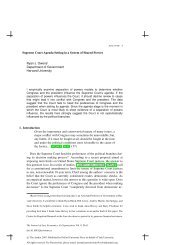1 Harvard University Political Theory Colloquium For 11 March 2010 ...
1 Harvard University Political Theory Colloquium For 11 March 2010 ...
1 Harvard University Political Theory Colloquium For 11 March 2010 ...
Create successful ePaper yourself
Turn your PDF publications into a flip-book with our unique Google optimized e-Paper software.
<strong>11</strong> <br />
ruling. On this basis, we can resolve tensions between the Protagoras, Gorgias, and<br />
Republic, when each of these dialogues is not reduced to a collection of propositions but<br />
is interpreted as a dramatic whole. It may help to note a parallel with my approach in the<br />
way that Myles Burnyeat has argued that ‘knowledge’ in the Theaetetus can be read out<br />
of the dialogue to be better construed as ‘understanding’ than as the more limited<br />
cognitive state of justified true belief assumed in much modern epistemology. Similarly,<br />
I argue here that ‘knowledge’ in the Protagoras can be read out of the dialogue to be<br />
better construed as ‘executive’ than as the more limited cognitive state assumed in the<br />
usual interpretation of Socratic intellectualism. 13<br />
The outer frame: Socrates on Simonides<br />
The topic of the ‘denial of akrasia’ is not confined to the measure doctrine. It is<br />
anticipated earlier in the Protagoras when Socrates is expounding the poet Simonides.<br />
Socrates says that Simonides was not so uneducated as to praise those who do no evil<br />
voluntarily (ekôn) ‘as if there were some people who do evil voluntarily (ekontes)’. He<br />
continues:<br />
<strong>For</strong> I am pretty much of this opinion, that no intelligent man believes that anyone<br />
does wrong voluntarily (ekonta examartanein) or voluntarily acts shamefully or<br />
badly (oude aischra te kai kaka ekonta ergazesthai), but they well know that all<br />
who do shameful and bad things do so involuntarily (akontes poiousin). And<br />
Simonides, for his part, doesn’t say that he praises those who do no evil<br />
voluntarily (ekôn), but he applies this term ‘the voluntary doer’ (to ekôn) to<br />
himself. <strong>For</strong> he thought that an upright man (andra kalon kagathon) often forces<br />
him[self] (epanagkazein) to be a friend and praise someone… good men (tous d’<br />
agathous) conceal it all and force (anagkazesthai) themselves [note: supplied: the<br />
Greek verb is not reflexive] to praise them, and if they get angry at their unjust<br />
treatment by their parents or their country 14 they calm themselves down [this is<br />
reflexive: autous heautous] and make friends again, forcing themselves<br />
(prosanagkazontas heautous] to love and praise them.



